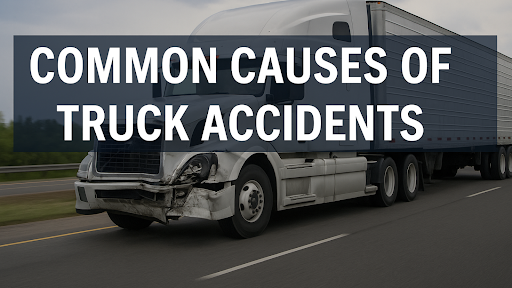Introduction
Truck accidents can have devastating consequences, leading to severe injuries, costly damages, and legal complications. For truck drivers, fleet owners, and trucking companies, understanding the primary causes of these accidents is crucial for improving safety and compliance. This article examines the most common factors contributing to truck accidents, backed by verified data and industry insights.
What are the Common Causes of Truck Accidents?

1. Driver Fatigue
Fatigue is one of the leading causes of truck accidents. Federal regulations limit driving hours to 11 hours within a 14-hour workday, followed by a mandatory 10-hour rest period. However, some drivers violate these rules due to tight delivery schedules or financial pressures.
Fatigue impairs reaction time, decision-making, and focus, increasing the risk of collisions. According to the Federal Motor Carrier Safety Administration (FMCSA), drowsy driving contributes to approximately 13% of commercial truck accidents. Companies must enforce strict compliance with Hours of Service (HOS) regulations and encourage drivers to prioritize rest.
Preventing Driver Fatigue:
- Regular rest breaks.
- Adherence to driving hours regulations.
- Proper sleep before long-haul trips.
- Use of electronic logging devices (ELDs) to track hours worked.
2. Distracted Driving
Just like any other motor vehicle, truck drivers can become distracted. Whether it’s texting, eating, adjusting the radio, or talking to a passenger, distractions can have serious consequences on the road. Even a momentary lapse in attention can result in a truck driver swerving into another lane, failing to stop at a red light, or missing a stop sign.
Preventing Distracted Driving:
- Use hands-free devices for phone calls.
- Avoid eating or drinking while driving.
- Encourage drivers to focus entirely on the road.
3. Impaired Driving (Alcohol & Drugs)
Impaired driving due to alcohol or drugs is one of the most dangerous behaviors on the road. While laws strictly regulate the amount of alcohol truck drivers can consume, some drivers may still attempt to drive under the influence. In addition to alcohol, other substances such as prescription drugs or even over-the-counter medications can impair a driver’s ability to operate a truck safely.
Preventing Impaired Driving:
- Random drug and alcohol testing for drivers.
- Driver education on the dangers of impaired driving.
- Strict legal penalties for violations.
4. Speeding
Speeding is a dangerous behavior that contributes to truck accidents, especially on highways and rural roads. A truck that’s traveling too fast has less time to react to hazards and requires a much longer distance to stop. In an emergency, the added weight of a truck can make it even harder to avoid collisions or react appropriately.
Preventing Speeding:
- Use of speed limiters in trucks.
- Regular monitoring of drivers’ speed.
- Driver training on the importance of following speed limits.
5. Poor Weather Conditions
Weather conditions like rain, snow, fog, or ice can significantly affect a truck’s ability to drive safely. Reduced visibility, slippery roads, and poor traction are common hazards for truck drivers. In these conditions, trucks may skid, lose control, or take longer to stop, increasing the risk of an accident.
Preventing Weather-Related Accidents:
- Monitoring weather forecasts before trips.
- Adjusting driving speed according to road conditions.
- Use of winter tires and chains in snowy weather.
6. Mechanical Failures
Trucks are complex machines with many moving parts. If a truck’s maintenance is neglected, it can lead to mechanical failures, such as brake malfunctions, tire blowouts, or engine failure. These issues can cause a truck to lose control or crash into other vehicles. For example, worn-out brakes may cause a truck to fail to stop in time, while a broken tire can cause the driver to lose control of the vehicle.
Preventing Mechanical Failures:
- Regular inspections and maintenance of trucks.
- Ensuring that brakes, tires, and other critical components are in good condition.
- Training drivers to spot early warning signs of mechanical failure.
7. Overloaded Trucks
An overloaded truck is not only dangerous for the driver but also for everyone else on the road. Overloading can cause the truck to lose stability, make it harder to brake, and increase the likelihood of tire blowouts. Moreover, the extra weight can strain the truck’s engine, leading to mechanical failures.
Preventing Overloading:
- Ensure that trucks are loaded according to weight limits.
- Use weigh stations to monitor truck loads.
- Educate drivers on the risks of carrying excess weight.
8. Tailgating and Aggressive Driving
Tailgating, or following other vehicles too closely, is a common cause of truck accidents. It reduces the amount of time a driver has to react if the vehicle in front suddenly stops or slows down. Truck drivers who engage in aggressive driving—such as speeding, cutting off other drivers, or failing to yield—are also at a higher risk of causing accidents.
Preventing Aggressive Driving:
- Encourage patience and safe following distances.
- Use of onboard safety systems like adaptive cruise control.
- Implementing driver behavior monitoring systems.
9. Improper Lane Changes and Turning
Large trucks require more space to change lanes or turn, and drivers must be careful to ensure they have enough room to do so safely. Failing to check blind spots, signaling properly, or turning too wide can lead to accidents with other vehicles, particularly smaller cars that may be in the truck’s path.
Preventing Lane Change and Turning Accidents:
- Truck drivers should always use mirrors and check blind spots before making a lane change.
- Training drivers on the proper techniques for turning and merging.
- Use of safety systems like lane-keeping assist.
10. Inexperience or Lack of Training
Inexperienced drivers may struggle to handle the complexities of operating a large truck. Whether it’s navigating through a city with tight streets or handling a truck in adverse weather conditions, inexperienced drivers can make costly mistakes. Proper training is essential to ensure that truck drivers are prepared for the challenges they’ll face on the road.
Preventing Accidents Due to Inexperience:
- Comprehensive driver training programs.
- Ongoing education and refresher courses.
- Mentoring by experienced drivers.
Conclusion
Truck accidents are often caused by a combination of factors, from driver fatigue and distractions to mechanical failures and weather conditions. By understanding the common causes of these accidents, we can take proactive steps to reduce the number of crashes and improve safety on our roads. Whether it’s ensuring proper rest, conducting regular vehicle maintenance, or encouraging safer driving behaviors, there’s much that can be done to prevent truck accidents. Staying informed and vigilant is key to making the roads safer for everyone.












